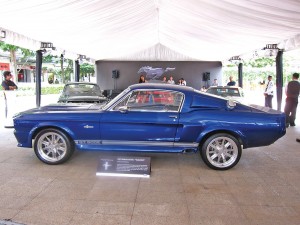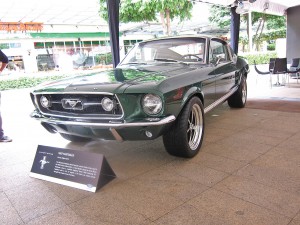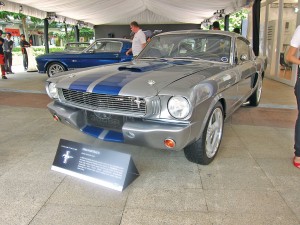Wild Horses at The Fort
At long last, Ford’s pony car has arrived. The Mustang, which had in phases changed from being an urban legend, going through a will-they or won’t-they phase, then an official preview at the 2012 Manila International Auto Show, and now finally the launch. Ford Philippines starts delivering customer cars in September.
Meanwhile, on August 25, Ford held a launch and drive event at Bonifacio Global City, to highlight the Mustang’s features, performance, and not least of all, its heritage.
The new Mustang comes very well equipped in two variants: 3.7-liter V6 Premium at P2.499 million; and the stonking 5.0-liter V8 GT Premium at P2.899 million.
This may be an all-new Mustang, but its look, derived from its famous forebears, is unmistakable. The front end scowls somewhat more than its now friendly-looking ancestors, but the round headlamps flanking the trapezoidal grille makes sure that you won’t mistake this car for anything else on the road, even before you spot the galloping pony badge in the center. Lending the Mustang a more modern touch are HID headlamps and LED running lights and for the rear, LED panels that form the trademark rectangular tail lamps. The tail lamps fire up in sequence when in turn-signal mode. Between the tail lamps is a high-gloss black panel again emblazoned with the pony logo in the center. There’s nary a blue oval logo anywhere on this car. Even the passenger-assist lamps under the exterior mirrors project the image of the running horse on the pavement.
The 3.7-liter V6 dishes out 305 hp and 380 Nm, while the 5.0-liter V8 delivers quite a lot more: 420 hp and 529 Nm. Either engine is paired with a six-speed automatic transmission that allows for manual-mode shifting via a selector button on the side of the shifter. Manual mode means full driver control, holding the gear up to redline until the driver shifts up. Redline for either engine is 7000 rpm.
Mustang offers driver-selectable levels of power assist. Sport mode cuts the assist and reportedly offers up more road feel, while comfort road adds boost while lessening feel. There’s a standard mode offering a level of assist and road feel between the two. The front suspension uses MacPherson struts, while the rear uses the traditional-Mustang solid axle with coil springs and stabilizer bar. The V8 GT comes with upgraded Brembo brakes-14-inch vented front disks, 19-inch alloy wheels, and summer performance tires. The V6 uses 17-inch alloys.
With such equipment, owners will be tempted to bring their car to a track, and the Mustang obliges further with its Track Apps, an onboard track computer. Taking the cue from cars like the Nissan GT-R, the system is centered around a 4.2-inch LCD screen planted between the two main gauges. Track Apps can display g-forces, 0-60 and quarter-mile acceleration time, braking time, and even a dragstrip-style countdown timer.

THIS 1967 GT500 Mustang fastback owned by Alex Sia comes with the full ‘Eleanor’ kit of the ‘Gone in Seconds’ movie fame
Comfort doesn’t take a back seat in the Mustang. The driver’s seat features six-way power assist, with passenger seat also powered in the GT. Standard features include leather seats, ambient lighting, auto dimming rear view mirror, aluminum trim on the instrument panel and door sills, and cruise control. The GT adds a huge glass roof with heat-resistant glass and a built-in manual shade panel, as well as a rear view camera and LED fog lamps.
Highlighting the Mustang’s rich heritage was a sampling of some of its iconic forebears: a 1966 fastback in stunning gray with blue stripes; a 1974 Cobra II; a 1967 fastback owned by Edgar Mortiz, which gained fame as Steve McQueen’s car in the “Bullitt”; a 1966 Convertible, the first-generation and original “pony car”; and perhaps the most famous classic Mustang, a 1967 GT500 bearing the trademarked name “Eleanor.” With its distinctive heritage a definite plus, and with the relatively affordable sticker price, the new-generation Mustang is set to carve out a new name among sports car aficionados.



